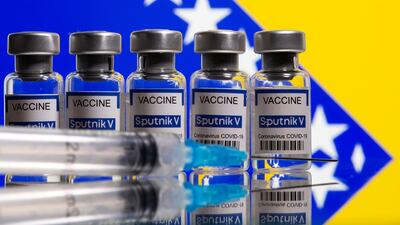Europe's medical regulator has called on Sputnik V manufacturers in Russia to urgently provide more information about the vaccine before its potential use in the European Union.
Officials are also seeking to inspect Russia factories and clinics where the vaccine is made to assess its use in combating Europe's escalating Covid-19 crisis.
Despite controversy over the Sputnik V vaccine, which received early approval for use in Russia last August without full trials, Emer Cooke, the European Medical Agency's executive director, made clear it was being seriously considered for use within the EU but she required more data.
“We urge the company to provide us with information as quickly as possible,” she told the European Parliament during a public health committee meeting.
To the surprise of some MEPs she said the regulator was “looking actively” at Sputnik V plus the US-made Novavax and the German-made CureVac.
“We're currently planning inspections of the manufacturing and clinical sites in Russia,” she said.
“I take this opportunity to stress again that we are committed to applying the same standards and scrutiny to this review as to any other scientific assessments.”
Her comments contradict views from European Commission members who have been adamant that there is no requirement for the Russian vaccine.
“We have absolutely no need of Sputnik V,” said Thierry Breton on Monday.
The Frenchman, who heads the EU executive's vaccine task force, said Europe had the capacity to deliver up to 350 million doses by June and by July 14 it will achieve "continent-wide immunity".
His words caused an immediate rift with the Russian Direct Investment Fund [RDIF], the sovereign wealth fund that backed Sputnik V, accusing him of prejudice against the Russian vaccine.
"Dear Commissioner Breton, please stop being biased. Europeans want a choice of safe and efficient vaccines, which you so far failed to provide," RDIF said on Twitter.
The message concluded that Sputnik V had been given emergency use authorisation in 54 countries, which include the UAE, Hungary and Argentina.
Other EU politicians showed their concern over the rising pandemic asking Ms Cooke how soon Sputnik V might be approved.
"We haven't put a timetable for when the actual authorization would be expected, because the evidence is still being generated," Ms Cooke said.
EU leaders are now under immense pressure to find a way out of the pandemic with infections increasing in some countries by 40 per cent in the past week and the continent-wide death tally about to pass one million.
The pressure has led to increased acrimony with Britain over vaccine exports and questionable criticism over the efficacy of the AstraZeneca-Oxford doses, damaging the confidence of Europeans taking vaccines.
While the EMA passed AstraZeneca as safe for use last week after 14 EU countries suspended its use over apparent links to blood clotting, Ms Cooke said further testing over its safety was needed.
“We are not in a position to definitively rule out a link between the vaccine and the [blood clotting] cases,” she said. “Therefore, we need to launch additional investigations to understand more.”
She confirmed that 13 million people in Britain, largely over-50s, had received the inoculation without noticeable reactions but there was anecdotal evidence that the clotting had occurred in women in the EU under 55. Further profiling of victims, including whether they smoked or took oral contraception, was required.
“When millions of people are vaccinated, it is inevitable that rare or serious diseases will be detected after vaccination,” Ms Cooke said. “Our role is to quickly detect and investigate these cases and determine if they are vaccine-related, or not."


